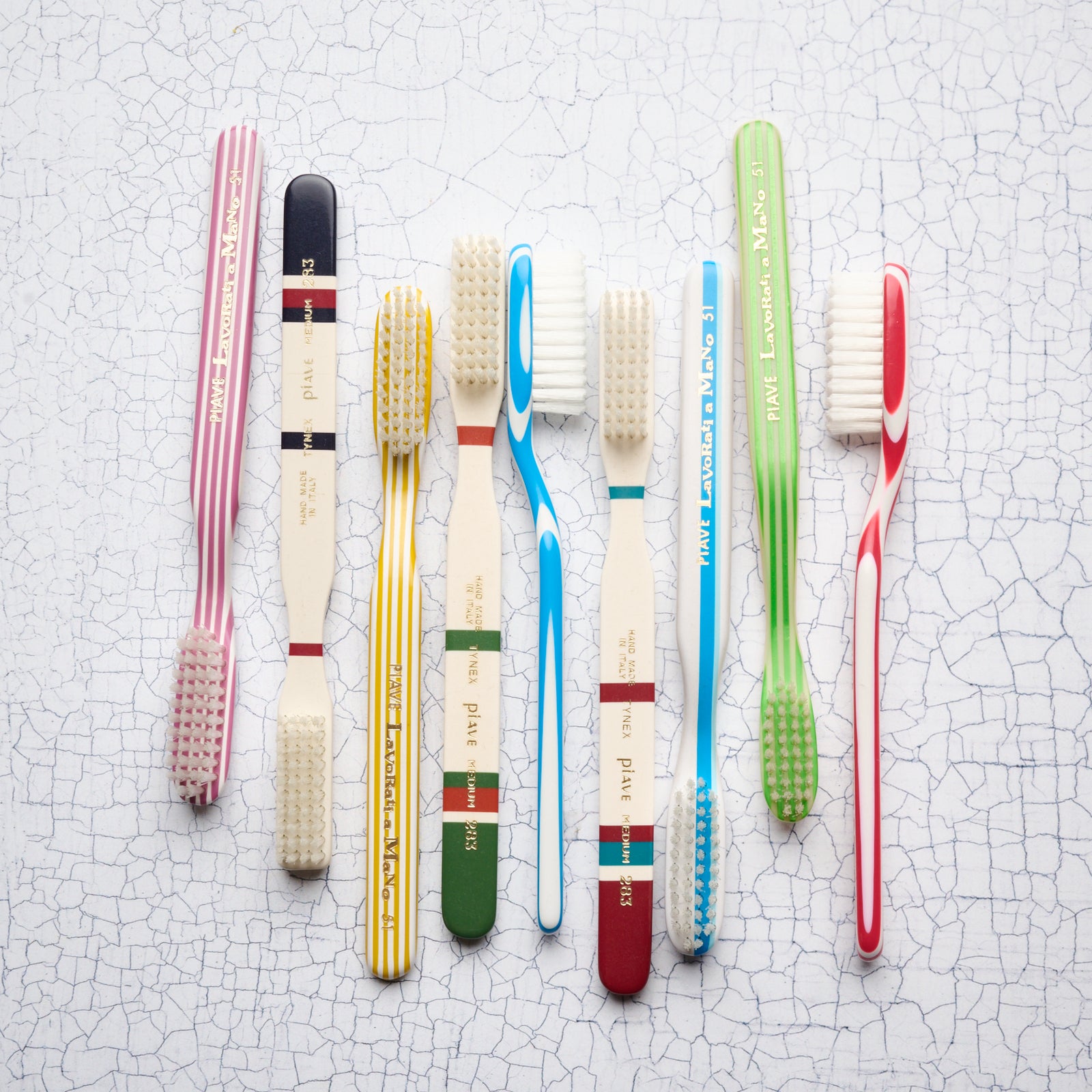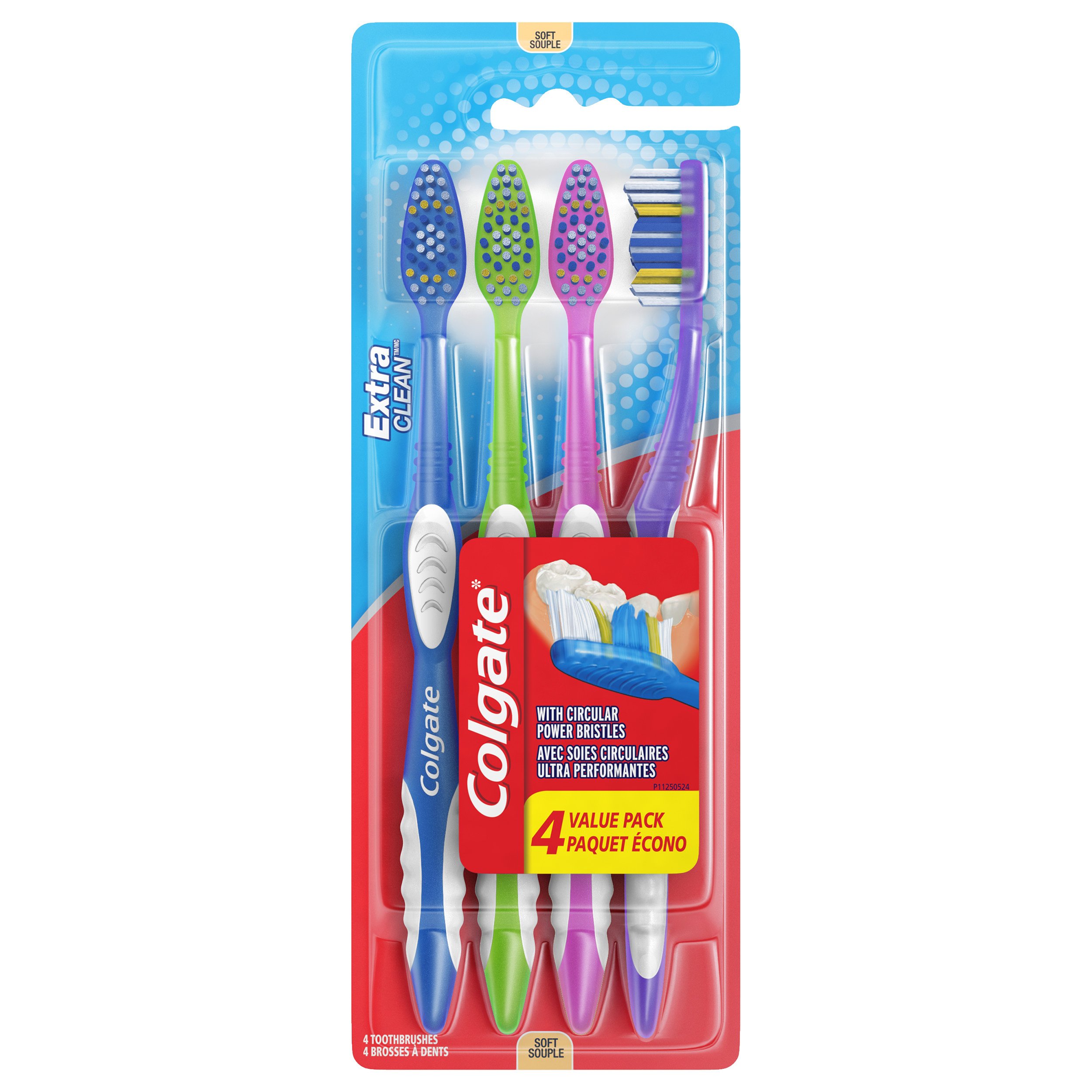Soft vs. Hard Bristles: How Toothbrushes Affect Gum Health
All Concerning Toothbrushes: Understanding Their Function in Maintaining a Healthy And Balanced Smile
Tooth brushes are basic devices in dental hygiene. They aid eliminate plaque and food particles, adding greatly to oral health and wellness. The variety of tooth brushes readily available today accommodates personal choices and certain oral needs. Recognizing these choices and their proper usage can result in far better dental treatment. However, many individuals might not understand the full effect of Toothbrush choice and maintenance on their total dental wellness. What variables should one consider to truly maximize their Toothbrush experience?
The History of Toothbrushes
The evolution of tooth brushes reflects humankind's continuous pursuit for dental hygiene. Early people utilized basic tools, such as branches and animal bones, to clean their teeth. The old Egyptians crafted torn ends of penetrate primitive tooth brushes around 3000 BC, while the Chinese developed the very first bristled Toothbrush in the 15th century, using pet hair attached to bamboo takes care of. This development noted a significant improvement in dental treatment.
Types of Toothbrushes
Various sorts of toothbrushes are designed to meet the diverse needs of individuals. Manual tooth brushes, one of the most typical kind, come in different bristle staminas and head sizes, allowing individuals to choose one that feels comfy and reliable. Electric toothbrushes have obtained appeal for their capability to give consistent brushing motion, frequently featuring timers and pressure sensors to enhance oral treatment. On top of that, there are specialized toothbrushes, such as those made for children, which often feature fun layouts and smaller heads for easier handling. Some individuals may like soft-bristled brushes, which are gentler on gums, while others go with tool or difficult bristles for a lot more hostile cleaning. Disposable tooth brushes serve as practical choices for traveling. Each kind serves an unique purpose, guaranteeing that customers can discover a toothbrush that aligns with their details dental health methods and preferences, ultimately adding to much better oral health.
Just how to Pick the Right Toothbrush

In addition, the handle should provide a comfy hold, enabling effective control throughout cleaning. Electric toothbrushes can be valuable for some, offering attributes like timers and pressure sensing units that improve oral treatment. It is additionally necessary to assess personal preferences, such as level of sensitivity and any type of particular oral conditions, when picking a toothbrush. Inevitably, seeking advice from an oral specialist can supply customized referrals, ensuring one selects a tooth brush that ideal meets their dental wellness needs.
Appropriate Toothbrush Use Techniques
Comprehending appropriate Toothbrush usage methods is essential for maintaining suitable dental wellness. This includes selecting the right brush, using the correct brushing technique, and sticking to recommended frequency and period for brushing sessions. Each of these factors plays a crucial role in attaining a brighter, much healthier smile.
Choosing the Right Brush
Choosing the proper Toothbrush is vital for maintaining suitable dental health and achieving a healthy smile. Customers should consider several variables when choosing a toothbrush. To start with, the bristle kind is crucial; soft bristles are generally suggested to avoid periodontal damage while successfully cleaning up teeth. On top of that, the brush head dimension ought to be ideal for the individual's mouth, allowing very easy accessibility to all areas (Toothbrushes). Furthermore, users may pick in between hands-on and electrical tooth brushes, with electrical alternatives often supplying enhanced cleansing performance. Individual choices, such as handle grip and color, can influence the choice. Making certain the right Toothbrush is picked can significantly impact the effectiveness of daily dental care regimens and add to long-term dental health and wellness
Correct Brushing Method
Many people have a toothbrush, not every person understands the right technique for efficient cleaning. Correct brushing starts with positioning the Toothbrush at a 45-degree angle to the gum tissue line, permitting the bristles to reach both the teeth and periodontals. Mild, circular activities are advised, staying clear of extreme scrubbing, which can damage enamel and aggravate gums. Each quadrant of the mouth must be provided equal interest, guaranteeing thorough cleaning of all surface areas-- outer, internal, and chewing locations. It is likewise vital to comb the tongue to eliminate microorganisms and refresh breath. Adhering to these techniques can improve plaque elimination and add to overall dental health, promoting a brighter, much healthier smile.
Regularity and Duration
Preserving a constant cleaning regimen is necessary for optimal dental health and wellness. Once in the morning and as soon as prior to bed-- to successfully eliminate plaque and prevent tooth decay, oral experts suggest cleaning at least two times a day--. Each brushing session should last for at the very least two mins, permitting sufficient time to clean up all surfaces of the teeth thoroughly. It is necessary to utilize gentle, circular motions to shield the gum tissues while effectively cleansing the enamel. In addition, individuals need to change their Toothbrush every three go to four months or quicker if the bristles come to be torn. By sticking to these guidelines, individuals can significantly boost their oral hygiene methods and add to lasting oral health and wellness. Uniformity in regularity and duration is key to preserving a healthy smile.

Tips for Keeping Your Tooth brush
Maintaining a toothbrush is important for oral health and wellness. Toothbrushes. Correct storage space strategies, a regular replacement timetable, and routine cleansing can substantially improve its effectiveness. By adhering to these guidelines, people can ensure their Toothbrush continues to be a reputable tool for attaining a healthy smile
Correct Storage Space Strategies
To ensure a toothbrush stays sanitary and reliable, correct storage space methods are vital. After cleaning, it is necessary to extensively rinse the Toothbrush under running water to eliminate toothpaste and debris. The Toothbrush should be saved upright in a holder, enabling air flow to promote drying out. Maintaining the Toothbrush in a closed container or drawer can promote bacterial growth as a result of moisture retention, so this must be avoided. Additionally, it is suggested to keep a range from various other tooth brushes to stop cross-contamination. For families with several users, specific owners can help maintain brushes different. Routine cleaning of the storage space area can further enhance hygiene, guaranteeing that the Toothbrush stays a trusted device for oral wellness.
Routine Replacement Set Up
A consistent substitute timetable is necessary for assuring the efficiency of a tooth brush. Dental professionals advise replacing tooth brushes every 3 to 4 months, or sooner if the bristles end up being frayed. Used bristles do not clean teeth properly and can nurture bacteria, decreasing dental health efforts. In addition, people recovering from disease needs to take into consideration changing their tooth brushes to stop reinfection. This straightforward habit advertises find out ideal dental health and improves the total effectiveness of brushing. In addition, those making use of electrical toothbrushes need to validate they change the brush heads according to the manufacturer's standards. Adhering to a routine replacement routine not just supports a healthy smile yet additionally enhances the relevance of maintaining proper dental health practices.
Cleansing Your Toothbrush
Cleaning a tooth brush frequently is essential for ensuring ideal dental hygiene. In time, toothbrushes can harbor germs, which might endanger oral health. To keep a tidy tooth brush, it is recommended to rinse it completely under warm water after each use, guaranteeing all tooth paste and particles are removed. Additionally, saturating the Toothbrush in a solution of equivalent components vinegar and water can assist decontaminate the bristles. This should be done when a week for ideal results. It is also a good idea to keep the Toothbrush in an upright position, enabling it to air dry and protect against wetness accumulation. Finally, prevent sharing toothbrushes, as this can transfer hazardous bacteria. Adhering to these suggestions can lengthen the life of the Toothbrush and promote better dental health.
The Influence of Toothbrushes on Oral Wellness
While many factors add to oral health, the selection of Toothbrush can considerably affect a person's oral health regimen. The style and bristle kind of a tooth brush are vital aspects that impact plaque removal and gum health. Soft bristles are generally recommended by oral professionals, as they successfully clean teeth without creating damage to the periodontals. In addition, the size of the Toothbrush head need to enable for very easy maneuvering in the mouth to reach all areas, consisting of difficult-to-access back teeth.
Electric tooth brushes have likewise gotten appeal as a result of their ability to provide more effective and consistent cleaning with oscillating or turning movements. Studies suggest that customers of electric toothbrushes commonly attain better plaque decrease contrasted to hand-operated brushes. Overall, the appropriate Toothbrush can enhance an individual's dental hygiene practices, causing improved overall health and wellness results and a lowered threat of dental problems such as dental caries and gum tissue disease.
Regularly Asked Concerns
Just how Often Should I Change My Toothbrush?
Specialists recommend replacing a toothbrush every three to four months or faster if the bristles come to be torn. Regular replacement assurances reliable cleansing and decreases the threat of germs accumulation, contributing to better dental hygiene overall.
Can I Use an Electric Toothbrush Without Toothpaste?
Yes, an electrical Toothbrush can be utilized without tooth paste (Toothbrushes). Using tooth paste enhances cleaning performance and supplies added advantages, such as fluoride security. Subsequently, it is typically advised to utilize tooth paste for suitable dental health
What Bristle Solidity Is Finest for Sensitive Teeth?
People with delicate teeth normally gain from soft bristle toothbrushes. These bristles effectively clean teeth while decreasing discomfort, permitting a my explanation gentler brushing experience that can help preserve oral hygiene without exacerbating sensitivity issues.
Do I Need a Special Toothbrush for Braces?

Are Bamboo Toothbrushes Better for the Atmosphere?
Bamboo toothbrushes are normally thought about better for the atmosphere as a result of their naturally degradable nature and lowered plastic use. They give a sustainable alternative, helping to lessen waste while still successfully promoting oral hygiene.
The old Egyptians crafted torn ends of sticks into primitive tooth brushes around 3000 BC, while the Chinese created the very first bristled Toothbrush in the 15th century, making use of animal hair affixed to bamboo handles. Understanding appropriate Toothbrush use techniques is important for keeping suitable dental health. Choosing the suitable Toothbrush is important for preserving ideal oral health and attaining a healthy and balanced smile. Keeping a toothbrush is vital for oral wellness. While several aspects contribute to dental wellness, the choice of Toothbrush can significantly affect an individual's dental health routine.